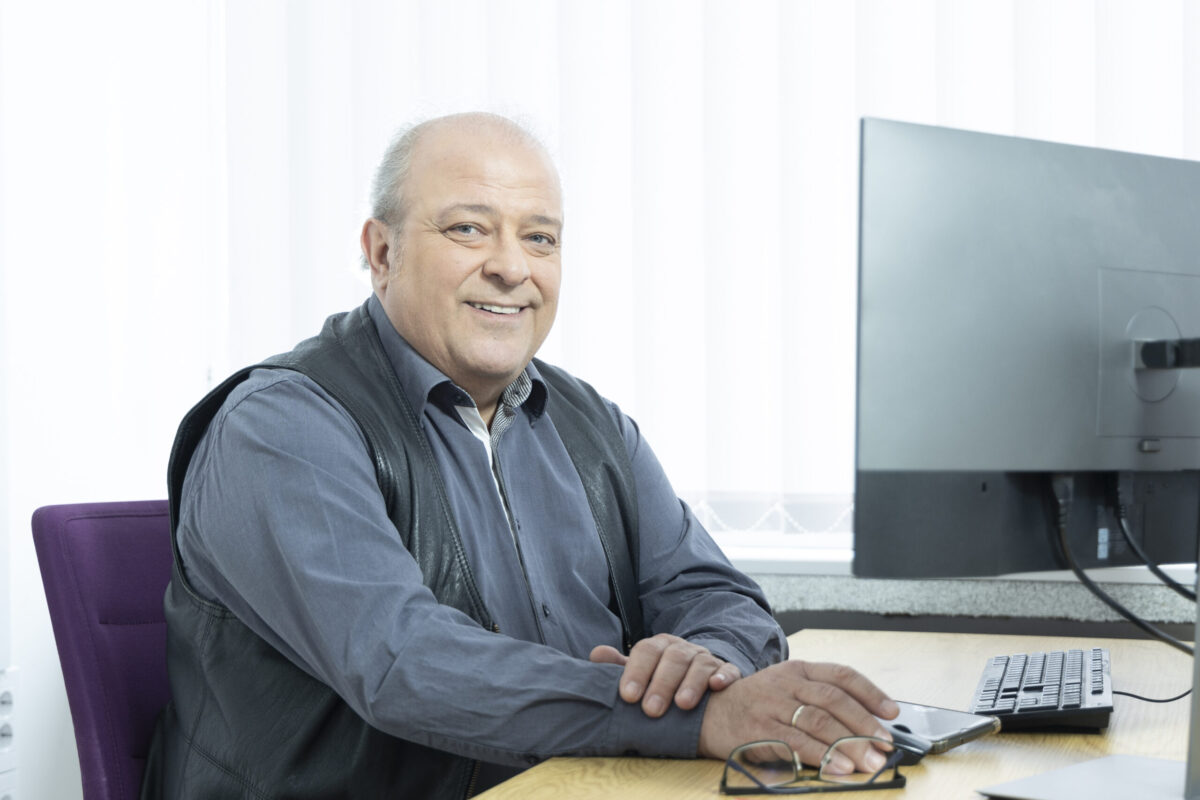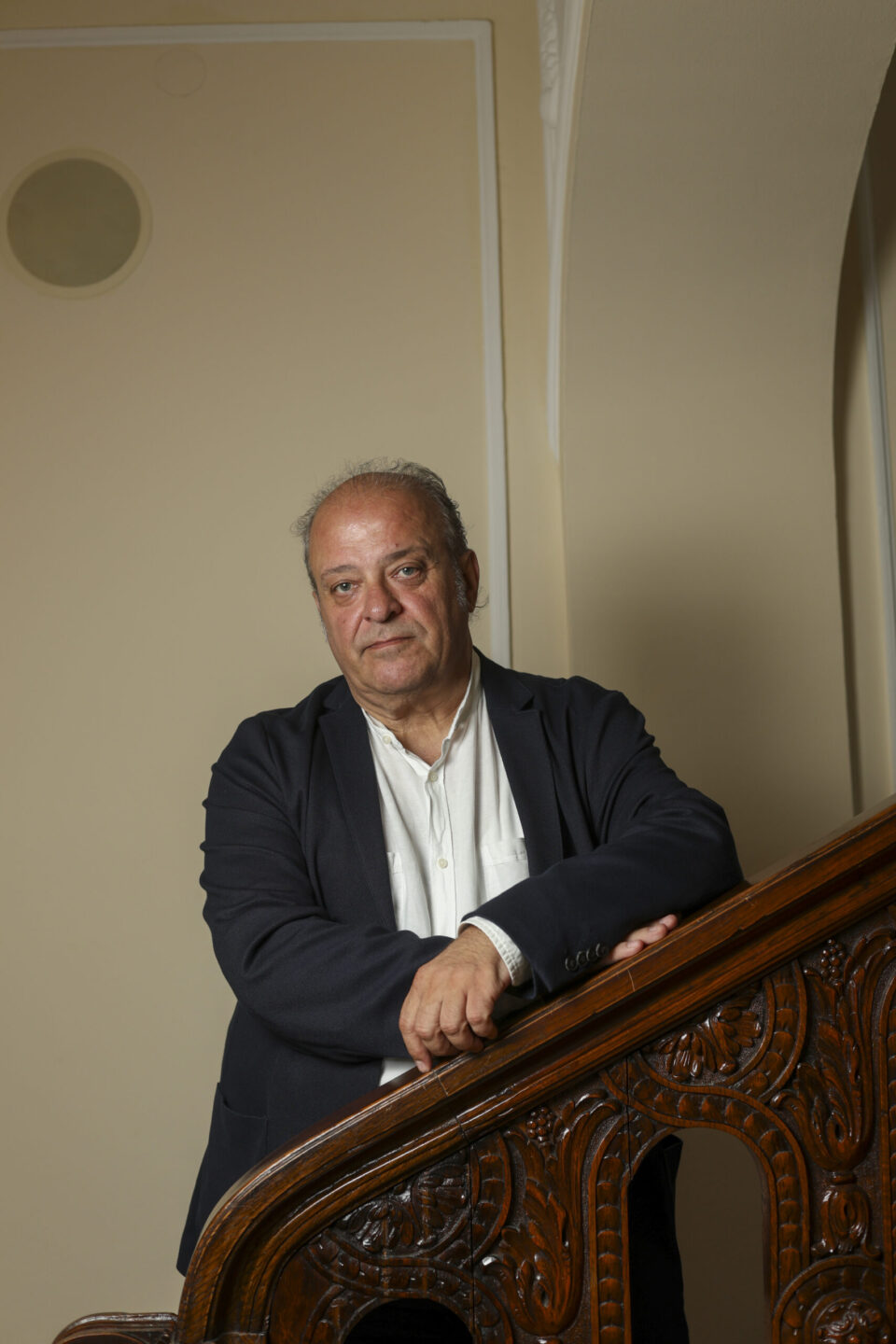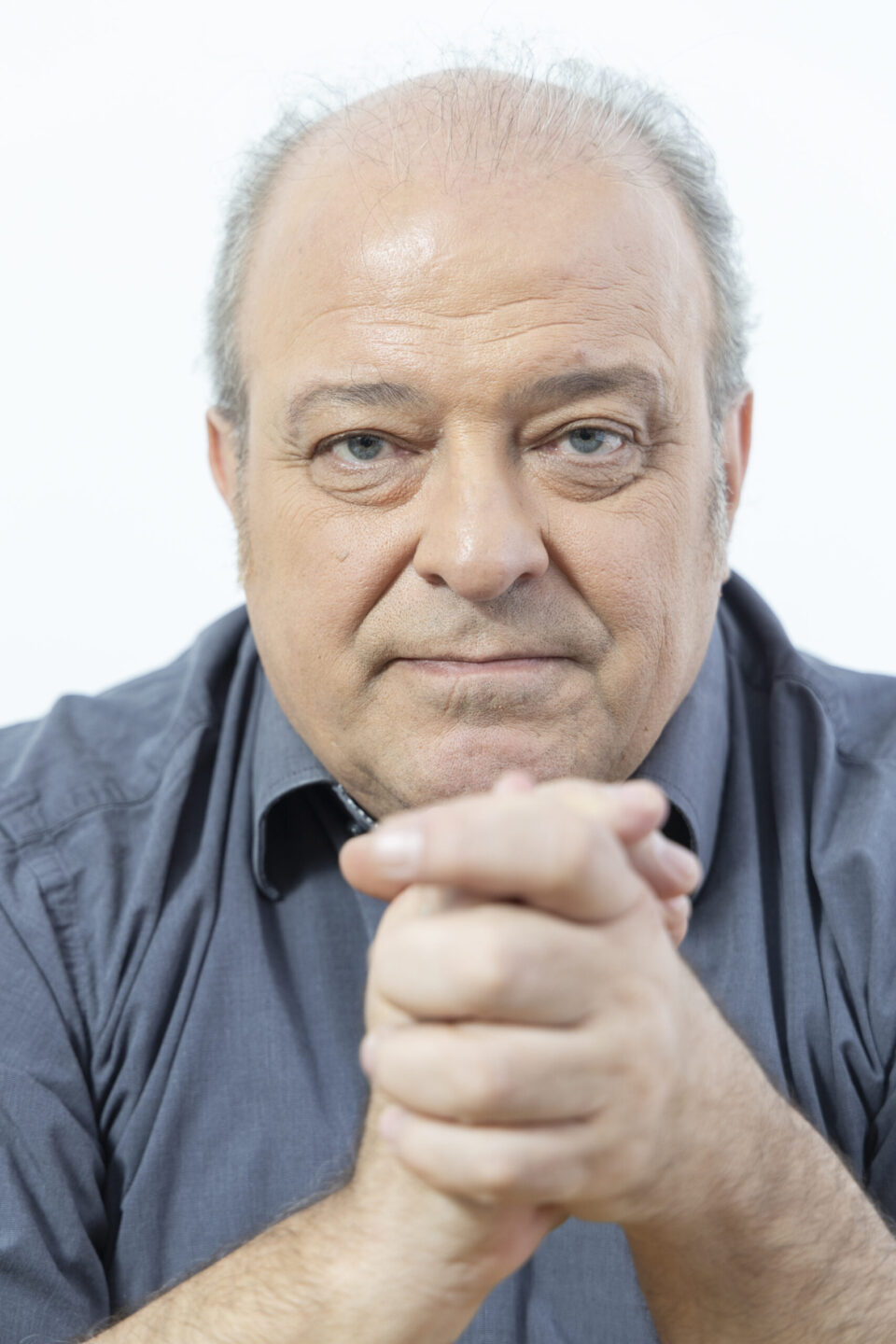Taking over the management of a magazine that celebrates 90 years of existence next year, the oldest in the Balkans and the sixth oldest in Europe is a great honour

Interview by: Dragan Nikolić
NIN, the oldest weekly magazine in the Balkans, has entered its 90th year with a new editor, an experienced journalist who says himself that he has been a journalist in two centuries, providing a personal testimony on how journalism has evolved from its initial principles to today’s modern standards. Aleksandar Timofejev, the journalist, still believes in the ideals with which he began but considers that more effort is needed to achieve media freedom and independence, as well as the safety of journalists
When almost the entire editorial team of NIN left this house due to disagreements with the owner, you took the helm. What motivated you?
When Jelena Drakulić, the owner of NIN magazine, called me to take over the position of editor, I was aware of the situation. We had several long meetings where we discussed her and my ideas. Our views on journalism and the vision of the magazine not only aligned but were almost completely synchronized. I consulted with several people I trust, including experts from the world of journalism and beyond. I also spoke with Milan Ćulibrk, the former editor of NIN, which is no longer a secret. I called him the night before I made the final decision. Milan is my friend, and I am also on good terms with most of the people from the former editorial team. We are all colleagues, and Belgrade is a small city where everyone knows each other. The decision to accept this role was not easy, but the challenge was enormous. Taking over the management of a magazine that celebrates 90 years of existence next year, the oldest in the Balkans and the sixth oldest in Europe is a great honour. This opportunity motivated me to start anew. It seems fate has destined me to often begin new projects, and this was a challenge to build a new editorial team from scratch. Only a few colleagues remained. Now, after 25-26 issues that we have created together, I can proudly stand behind each one of them. People can say different things, but every time I wake up and look at myself in the mirror, and that is the most important thing where there are no lies, I know I did not make a mistake. Our collaboration is working well, exactly as we agreed from the beginning – there are no forbidden topics or people. NIN is open to all ideas and topics, and it will remain so. For now, I am very satisfied with what we have achieved.
Why does it matter who owns the media? Doesn’t that tell us that independent journalism doesn’t exist and that all media, regardless of which side of power they’re on, are dependent on their owner or have someone who controls the information?
The question of media independence is raised, especially when owners have significant influence. Throughout my career, I have worked within different ownership structures in the media – from public service to private media companies. I spent eight years at Radio Television of Vojvodina, which was like a second home to me. I carry beautiful memories and friendships from that period, both collegial and private. I worked during the time of socialist Yugoslavia when Studio B was owned by the Socialist Alliance of Working People of Belgrade or some such organization. I was also part of Radio B92, which was first owned by the Student Union, and later privatized, where I was one of the co-owners. Our goal was to create a private public service, which was a wonderful utopia. Unfortunately, that didn’t succeed, and in the end, we sold B92. Now, I work in a private company, owned by a single person. NIN is 100% a private firm, without the involvement of other capital. When we talk about independent journalism, I like to quote the late Bogdan Tirnanić, who told me: “The freedom of journalism is won every day.” Every morning, you come to work and reclaim the space for free reporting. It’s important to maintain an independent media policy, where no one dictates the topics we will cover or how we will write about them. We have open discussions on various issues, but I do not allow anyone to impose content on me, and no one does.
It is important to maintain an independent media policy so that no one dictates the topics we will cover or how we will write about them.

What about one of the basic principles of journalism, to hear all sides?
I am somewhat shocked by this. I learned journalism at a time when it was normal to present both sides of the story. Today, journalism is so polarized that it is unimaginable. Either you are with us or against us; there is no middle ground. I am not here to be with you or against you. I am a journalist. This polarization is completely incomprehensible to me. I must admit that for the eight years I was at RTV, I was not directly involved in journalism in the classical sense. I was the head of the integrated communications sector, which was a very interesting job but not directly related to the program. However, I was an occasional correspondent for WDR, the German public broadcaster, which broadcasts programs in the former Yugoslav languages, so I was continuously involved in journalism, but for foreign media. The polarization in the media is incomprehensible to me. In NIN, I assume you have had the opportunity to flip through our issues, and you can see from the covers who we feature. We are open to everyone. In the beginning, we faced a kind of boycott from both sides; everyone was suspicious of us. When they saw what we were doing, they wondered how we could have both sides. But why wouldn’t we? Readers should have the opportunity to hear all sides. This is the only kind of journalism I want to practice in the remaining time of my career. I have taught journalism a lot, at universities and in courses, and I always explained to students that this is the only way journalism can function. Unfortunately, this polarization is not just a characteristic of Serbia. In America, for example, one television station is on one side, another on the opposite; there is no middle ground. I spoke with a colleague from the reputable site Politico who was shocked by the same phenomenon in Brussels where he works. This trend of simplifying and creating instant content is a global problem. People don’t have time to read books; everything comes down to short texts that can be read in a few minutes.
Does that mean that society does not seek the truth? Is it possible that we, as a society, the public, do not care about the truth and do not want to hear it?
These are questions that delve into serious philosophy, psychology, and pathology. However, I would not limit this only to us; it is the same in our surroundings and the world. Will it get better? That’s the essential question. I’m afraid it won’t. Maybe this is just a phase in the development of humanity, where we are moving towards black-and-white, simplified solutions. What will happen? I don’t belong to the type of sage who contemplates the future, but it is clear that the whole society is in a period of fast and simple solutions.
Speaking of the future, how will artificial intelligence affect journalism?
I am very interested in that too. I have a hundred ideas. At the first meeting, I asked that we have something related to AI in every issue. This is something we are only beginning to encounter. AI has an influence on everything, including journalism. Am I happy that AI will overwhelm us? No, but it is inevitable, and that trend will continue.
Dangerous things will happen, like deepfakes. I speak as if this will be in the future, but it is already happening now. We will be able to put words in people’s mouths that they never said, and it will go unnoticed.
I am not here to be with you or against you. I am a journalist.
What are the current salaries in journalism, how do media outlets generate revenue how are they financed, and do they depend on advertisers and financiers?
Media outlets can survive in several ways. The first is through subscriptions, as is the case with the two public broadcasters in Serbia, although this is not a completely reliable solution. The second method is through marketing and advertisers, and the third, which I don’t think exists here, is through voluntary contributions. The law provides for the possibility of voluntary contributions. Additionally, media outlets can apply for projects funded by ministries, and foreign and domestic organizations. However, the main source of revenue remains marketing.
We all practically operate in the market, in one way or another. The struggle against the influence of marketing and large advertisers on operations is something I have experienced personally. At the beginning of my career, when we founded Studio B television, I hosted the show “From Gossip to Truth and Back.” During my annual leave, my colleague Zoran Ostojić replaced me, and someone raised a question about alleged malpractices at the Belgrade Fair, which at the time had a third of all the ads on STB. Shortly after that, the Fair cancelled all its ads on STB, creating a problem with how to distribute salaries.
A similar situation happened at B92. We aired a documentary about how a global brand uses child labour to produce its products. The film was explosive when it appeared worldwide. When we were preparing to broadcast it, we received a warning from the importer of that brand that it would not be wise. Nevertheless, we aired the film, after which the importer withdrew all ads for their brands from B92, which constituted a significant portion of our advertising revenue.
That was an important lesson – no sponsor or agency should have more than a 10% share in revenue to ensure stability in case of withdrawal. I am sure that such pressures still exist. As a director, when I returned to Studio B, my task was to protect journalists from such economic pressures. It is not just about preventing something from being published, but also about being pressured to publish something. As someone who runs a media house, you must protect your people from such pressures.

Violence against journalists (e.g., the attack on Vuk Cvijić) remains unpunished, and society and the profession are even more divided. How do you assess the position of journalists in Serbia today, and how dangerous is it to be an investigative journalist?
There has never been a time when it wasn’t dangerous. We talk about different periods, and I’ve been a journalist in two centuries. I believe that journalists need to be granted official status. There are now some demands for the prosecution to react quickly. Fortunately, in this case, there were no severe consequences, but there have been many worse and more serious situations—heads were rolling, and people’s homes were set on fire.
People often ask me if things are the same now as they were back in the 1990s. I answer that back then, heads were rolling. It has never been easy to be a journalist, anywhere, including here. Were there pressures or threats in my case? Of course, I felt them personally. A few times, I was discreetly warned by people who knew what was happening on the other side of justice not to go out alone. My stance was that if I listened to such advice, I would fall into paranoia and start looking over my shoulder. I didn’t follow their advice, and fortunately, nothing happened to me.
It is clear that the whole society is in a period of rapid and simplistic solutions
Here’s just one example from the assembly after October 5th. The most interesting discussions always took place in the assembly restaurant. There, members of the new government (the October 5th ones) and the old government would often debate in a more relaxed atmosphere, and we journalists were also there. On one occasion, the former police minister from Milošević’s time, the late Vlajko Stojiljković, said to me, “So, Timofejev, you’re the independent journalist. Tell everyone here, when were you safer—when I was in power or now, with this Dušan Mihajlović?” I replied that during his time, I still had to sometimes look over my shoulder to see if I was being followed, to which he responded, “Well, why, we didn’t kill people like you.”
I have close friends among journalists who have had police protection for years. It’s a real hell. I knew what they were going through because of their work and their refusal to make any compromises.
That’s why I repeat—journalists should be granted official status.
Will the truth survive? Is there a future for independent media in Serbia? And how can we achieve that goal?
I wouldn’t be doing this job if I didn’t believe that the situation would improve and that this is something extraordinarily important. How to achieve that goal is a much harder question, but the struggle continues. It’s a return to the core values of journalism. There is only one fundamental principle—don’t lie!
The bigger problem here is that public discourse has no weight. We notice that public discourse is losing significance everywhere. To what extent social media and artificial intelligence have contributed to this is a question for futurologists. How everything will look in the future, I don’t know. We’ll see.